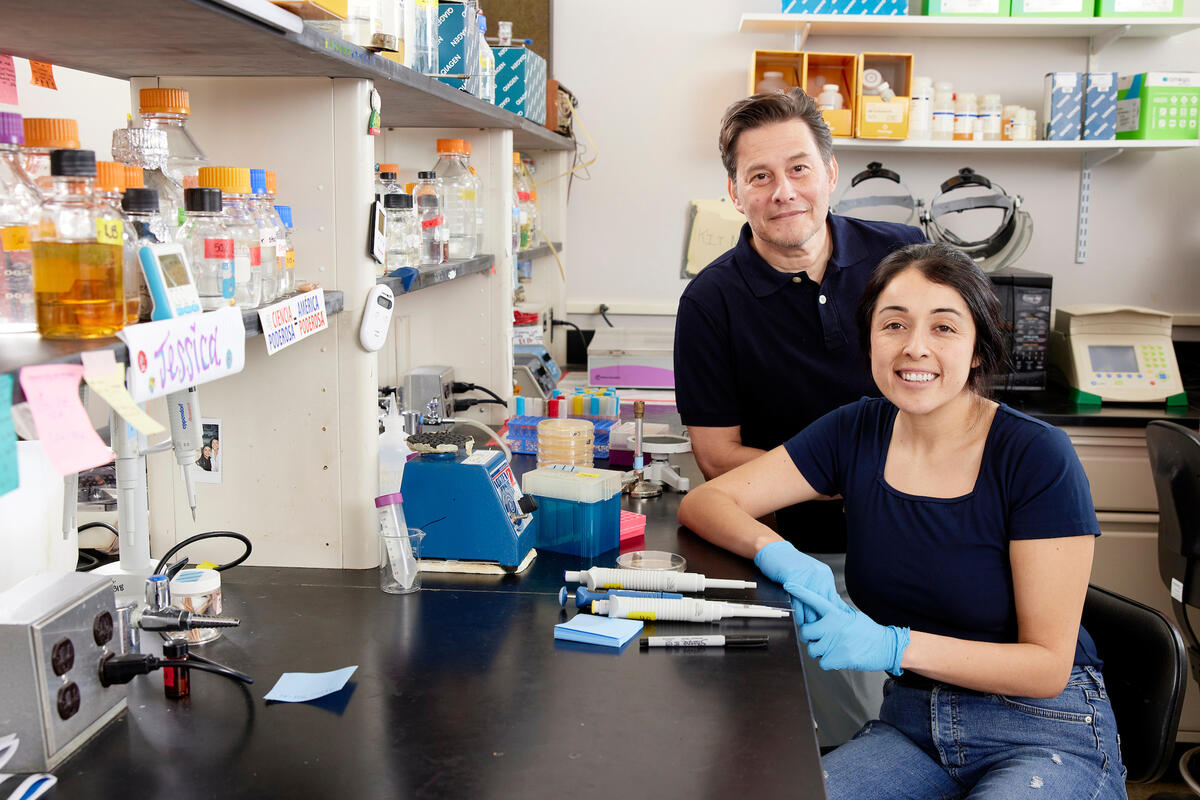At UNLV, Jessica Grifaldo is in a category all by herself. This fall, the first-generation Latina student will continue her education as part of the prestigious National Science Foundation Graduate Research Fellowship Program.
Grifaldo is the only UNLV student to be awarded the fellowship this year and only one of three in the state of Nevada in 2023. The fellowships are highly competitive, with annual acceptance rates of 16% from among the more than 12,000 applicants. Recipients must demonstrate potential for significant achievement in science and engineering.
Grifaldo says receiving the fellowship, which offers a stipend of $37,000 annually for three years, is a great relief. “To receive a living wage while going to school — I can’t believe it.”
But her story also demonstrates how creating small opportunities for students to get involved in research as undergrads eventually leads to a more diverse faculty overall.
From Community College to Ph.D.
Grifaldo attended Cypress College, a community college near Los Angeles, and eventually transferred to California State University, Long Beach.
During the summer of 2021, when many COVID precautions were still limiting work, she sought out opportunities to do research in person. She applied to and was selected for UNLV's Research Experiences for Undergraduates (REU), a summer program that brought her to UNLV to work in Eduardo Robleto’s lab in the School of Life Sciences.
“(Jessica) has an electric personality and is hard working. She is what you want in a grad student,” Robleto says. “When I’m selecting students for my lab, a good lab background is great, but some students have never had that opportunity. So, I focus on students who are driven and enthusiastic.”
Robleto oversees the National Science Foundation REU Site grant that supports 10 undergraduate students for nine weeks each summer. The program aims to provide the students with hypothesis-based projects that investigate mechanisms of evolution and promote careers in science.
The REU grant has been funded at UNLV for the past 16 years and Robleto and his colleague Kurt Michael Regner were awarded the grant again this year. It will support a total of 30 students over the next three years.
Robleto says it has proven to be an effective tool to for increasing the representation of students from historically excluded communities in science overall. And more specifically, to help UNLV recruit graduate students. Grifaldo is now a Ph.D. student at UNLV.
“We need to make stories like Jessica’s more common. We have a diverse campus. It’s easy to find minority undergraduate students in the science fields, but it gets harder at the graduate and Ph.D. levels. It is important to give them a chance. We have great talent at UNLV, but unless we help them, they don’t have a chance to express that talent.”
Nine former REU participants have either completed or are currently pursuing a graduate degree in the School of Life Sciences. Two other past participants completed M.S. and Ph.D. degrees in the UNLV geosciences and chemistry departments.

Grifaldo says meeting Robleto and learning about his background made her believe she could follow a similar educational path.
“When I decided to come to UNLV as a Ph.D. student, I was scared. But then I told myself, 'How can you be afraid to leave Los Angeles when Dr. Robleto left his country of Nicaragua to come to the United States?' He knows what it’s like to take a leap of faith. He’s why I am here.”
And why she landed that lucrative fellowship. It will support Grifaldo's research on understanding a cellular protein called Mfd. It previously was known to function in repair of DNA and it influences the ability to swim in bacteria, an important adaptation to stress. The project will lead to a better understanding of how bacterial cells, including those that cause human infections, respond to stresses like those presented by changing environments or those faced by bacterial pathogens during the process of infection.
Robleto hopes that Grifaldo's success will help to increase the number of Hispanic professors in Las Vegas and beyond.
“When trying to improve graduation rates among underserved students who are Hispanic, it helps to have a professor who mirrors them. Diverse campuses have higher graduation rates if the professors are also diverse.”
Grifaldo says she appreciates the support from Robleto and is dedicated to paying it forward by mentoring other minority students. She recruits students to his lab and works in the STEM² program at Cypress College as a peer mentor to minority students.
As part of the program, she meets with 60 students three times a year, conducting workshops on writing resumes and helping them apply to summer research and internship opportunities. The relationships she's built has led to heart-to-heart conversations with DACA students who fear being sent to a country that they don’t even know and with students who grapple with issues such housing insecurity, some to the extent of being homeless.
Grifaldo says she understands where these students come from. She, like many of UNLV's students, come from what's called Historically Excluded Communities in the sciences.
“I know the barriers and challenges that these students face in academia. Those are the students I want to reach, the ones who had to fight for their education, who didn’t come from a privileged background. I believe all students have a right to learn and all students can learn complex science but they need a school support system that comprises mentors and role models of similar academic trajectories.
"This is what motivates me to become a microbiology professor — to mold the next generation of HEC scientists and health professionals."
Robleto hopes to see further development of programs that help students through the long application process for fellowships. “If we can create a supportive program specific to fellowships like [Grifaldo's], our numbers could increase dramatically.”
Learning how to apply for the program is a good exercise in itself, he notes. It grounds the student and gives them a clear map of their graduate project and, more importantly, it gives them a strong template for submitting to other graduate fellowships.
As Grifaldo prepares for the next stage of her educational path, she can’t help but marvel at where she is today.
“Attending grad school is something I never saw coming. When I decided to enroll in community college, I remembered I was good at math in high school and that led me to pursue a science degree. But I still didn’t know exactly what I wanted to do career-wise. Everyone said that my personality would fit nicely as a high school science teacher. But after attending various research opportunities, I knew the lab setting was where I wanted to be. I love the feeling of making a novel discovery, and at least for a portion in time, I’m the only person in the world that knows this information."



